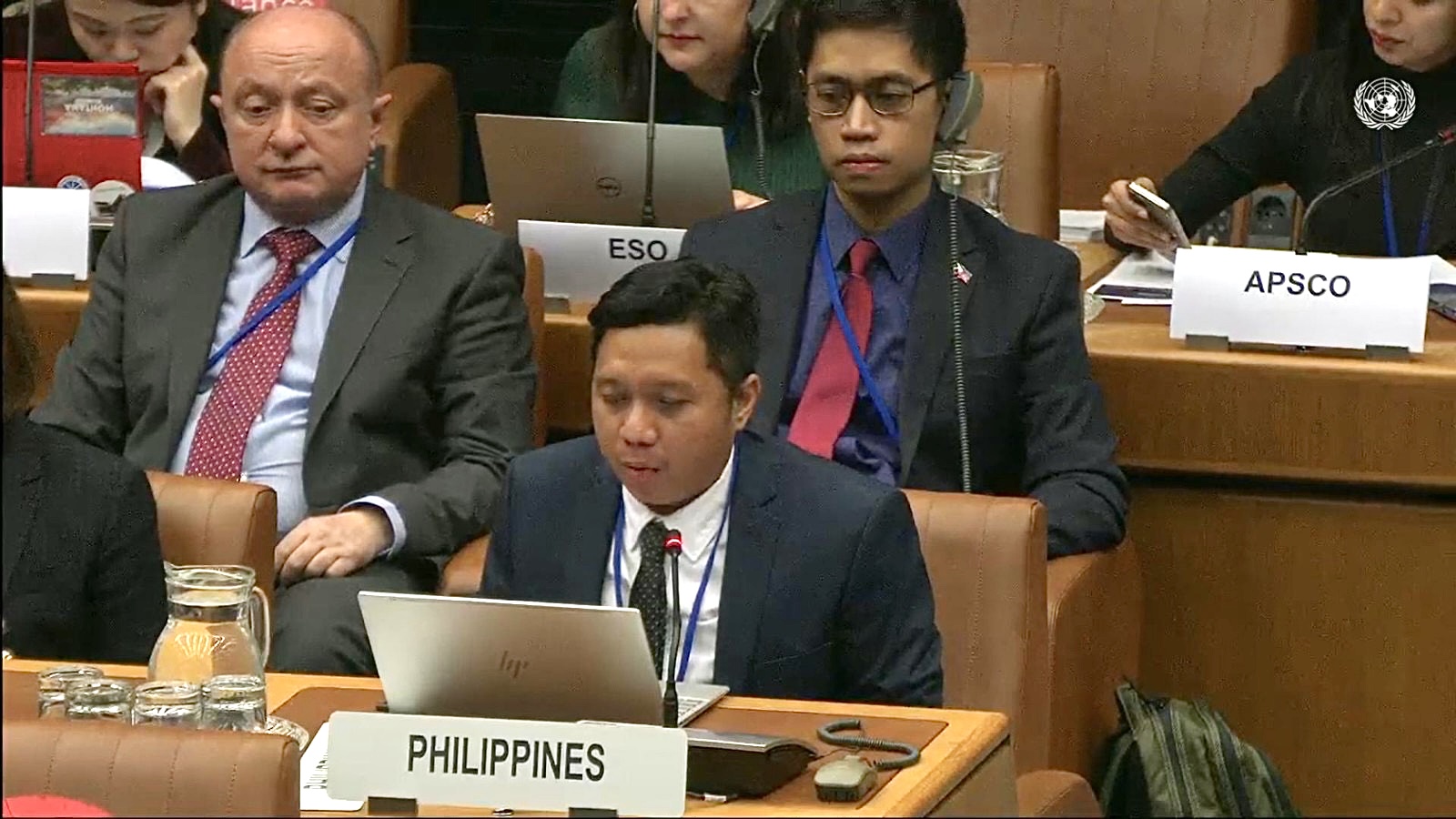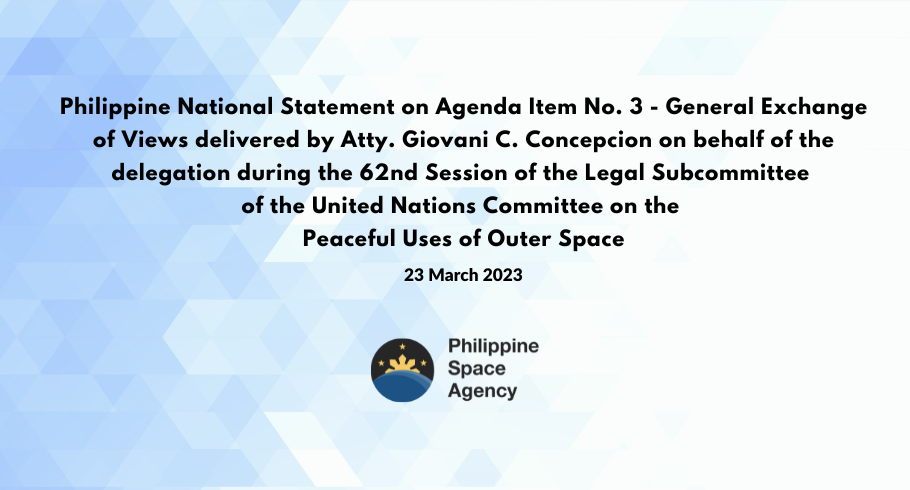62ND SESSION OF THE UNITED NATIONS COMMITTEE ON THE PEACEFUL USES OF OUTER SPACE
PHILIPPINE NATIONAL STATEMENT
AGENDA ITEM NO 3 “GENERAL EXCHANGE OF VIEWS”
delivered by
ATTY. GIOVANI C. CONCEPCION
CHIEF, SPACE POLICY AND LEGAL AFFAIRS DIVISION ON BEHALF OF DIRECTOR GENERAL JOEL JOSEPH MARCIANO, JR., PH.D.
PHILIPPINE SPACE AGENCY (PhilSA)
Thank you, Madam Chair.
On behalf of the Philippines, I would like to assure you Madam Chair Ms. Nomfuneko Majaja of South Africa of my delegation’s full support for your Chairmanship of the 62nd session of the Legal Subcommittee of the UN COPUOS.
We would also like to take this opportunity to thank the Acting Director of the UN Office for Outer Space Affairs and Secretary of the Subcommittee, Mr. Niklas Hedman, and the Secretariat for the preparations made in convening this subcommittee meeting.
Since this is the first time for our delegation to speak in this session, we would like to express our sincere gratitude to Argentina, Canada, China, the European Union, Germany, South Korea, United Arab Emirates, and the United States for extending their assistance particularly with regard to provision of satellite images through the activation of the International Charter Space and Major Disasters. The images that we have received are helpful as we respond to the recent major oil spill incident in Oriental Mindoro, Philippines.
Madam Chair,
The Philippines reaffirms its commitment in ensuring that the country abides by international space treaties and principles of the United Nations. As we support the efforts toward the universalization of the treaties, the country recognizes that it is our inherent responsibility as a member of the global space community to significantly contribute towards ensuring a safe, stable, and sustainable space environment and conduct of space activities.
The Philippine Space Agency is pleased to inform you that we have received support from other relevant Philippine government agencies in its effort to ratify the Liability Convention and accede to the Registration Convention. The two conventions signify our country’s strong commitment to the global norms and principles that strengthen the institution and enable good governance in space science and technology activities that will benefit current and future generations. We are optimistic about the formal adoption of the UN Space treaties in the country in the near future.
Madam Chair and distinguished delegates,
I am honored to inform you that in 2022, the Philippines signed cooperation agreements with the UAE Space Agency (UAE), and entered into agreements with Space for Climate Observatory (France), Philippine-American Educational Foundation (Fulbright Philippines), and Hokkaido University (Japan). These agreements aim for the development of space science and technology through various mechanisms such as capacity-building activities, joint research and development, joint scientific missions on space explorations, as well as the promotion of space industry and industrial cooperation.
As a developing country, we underscore the efforts of navigating the realms of international cooperation to further build the country’s space ecosystem in accordance with the existing international law. Hence, the Philippines recognizes the importance of capacity-building in space law. This will be further elaborated by our statements to be delivered for agenda items 8 and 12.
The Philippines aligns itself with the statement of the Group of 77 and China, and expresses its support for the recommendation of greater interaction between the Scientific and Technical Subcommittee and the Legal Subcommittee. The country believes that along with the recent developments in space scientific and technical activities, spacefaring nations should conform to the existing United Nations legal instruments.
Madam Chair, we have established a PhilSA Technical Working Group on Orbital Debris Protocols which serves as the advisory body for the coordination, discussion, formulation, and integration of strategies, protocols, guidelines, and similar mechanisms to promote and ensure appropriate responses to rocket launches and other outer space activities that can pose risks to the Philippines and the region. We will further elaborate on this matter on Agenda item 11 of this subcommittee meeting.
In closing, the Philippines, as an emerging space-capable country, will continue to pursue the country’s interest in the development of the space science and technology ecosystem. We encourage continuous dialogue with all actors in the international space community to be more committed and proactive in adherence to the existing legal instruments that will utilize and promote the peaceful uses of outer space.
Thank you, Madam Chair.

Atty. Giovani C. Concepcion, Chief of the Space Policy And Legal Affairs Division, delivering the Philippine National Statement on Item 3 on the General Exchange of Views during the 62nd Session of the Legal Subcommittee of the UN COPUOS.




